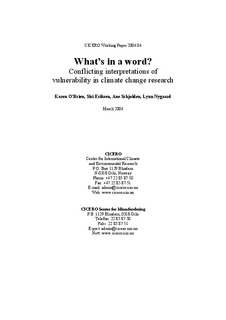What's in a word? Conflicting interpretations of vulnerability in climate change research
Working paper
Permanent lenke
http://hdl.handle.net/11250/192322Utgivelsesdato
2004Metadata
Vis full innførselSamlinger
- CICERO Working Papers [167]
Sammendrag
In this paper, we discuss two competing interpretations of vulnerability in the climate change literature and consider the implications for both research and policy. The first interpretation, which can be referred to as the “end point” approach, views vulnerability as a residual of climate change impacts minus adaptation. The second interpretation, which takes vulnerability as a “starting point,” views vulnerability as a general characteristic generated by multiple factors and processes. Viewing vulnerability as an end point considers that adaptations and adaptive capacity determine vulnerability, whereas viewing vulnerability as a starting point holds that vulnerability determines adaptive capacity. The practical consequences of these two interpretations are illustrated through the examples of Norway and Mozambique. We show that, if the underlying causes and contexts of vulnerability are not taken into account, there is a danger of underestimating the magnitude (large), scope (social and environmental) and urgency (high) of climate change.
